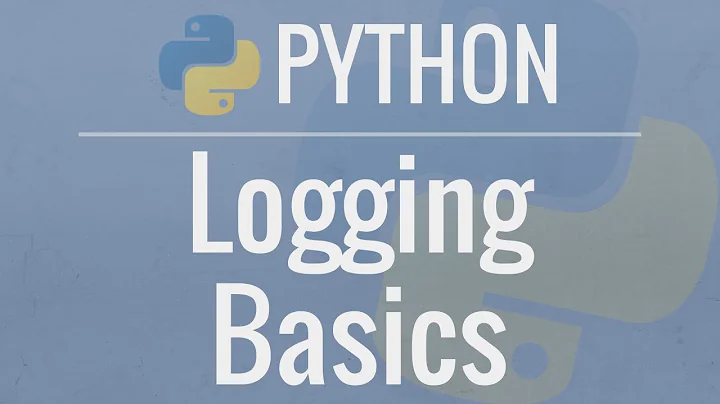Python logging: use milliseconds in time format
Solution 1
This should work too:
logging.Formatter(fmt='%(asctime)s.%(msecs)03d',datefmt='%Y-%m-%d,%H:%M:%S')
Solution 2
Please note Craig McDaniel's solution is clearly better.
logging.Formatter's formatTime method looks like this:
def formatTime(self, record, datefmt=None):
ct = self.converter(record.created)
if datefmt:
s = time.strftime(datefmt, ct)
else:
t = time.strftime("%Y-%m-%d %H:%M:%S", ct)
s = "%s,%03d" % (t, record.msecs)
return s
Notice the comma in "%s,%03d". This can not be fixed by specifying a datefmt because ct is a time.struct_time and these objects do not record milliseconds.
If we change the definition of ct to make it a datetime object instead of a struct_time, then (at least with modern versions of Python) we can call ct.strftime and then we can use %f to format microseconds:
import logging
import datetime as dt
class MyFormatter(logging.Formatter):
converter=dt.datetime.fromtimestamp
def formatTime(self, record, datefmt=None):
ct = self.converter(record.created)
if datefmt:
s = ct.strftime(datefmt)
else:
t = ct.strftime("%Y-%m-%d %H:%M:%S")
s = "%s,%03d" % (t, record.msecs)
return s
logger = logging.getLogger(__name__)
logger.setLevel(logging.DEBUG)
console = logging.StreamHandler()
logger.addHandler(console)
formatter = MyFormatter(fmt='%(asctime)s %(message)s',datefmt='%Y-%m-%d,%H:%M:%S.%f')
console.setFormatter(formatter)
logger.debug('Jackdaws love my big sphinx of quartz.')
# 2011-06-09,07:12:36.553554 Jackdaws love my big sphinx of quartz.
Or, to get milliseconds, change the comma to a decimal point, and omit the datefmt argument:
class MyFormatter(logging.Formatter):
converter=dt.datetime.fromtimestamp
def formatTime(self, record, datefmt=None):
ct = self.converter(record.created)
if datefmt:
s = ct.strftime(datefmt)
else:
t = ct.strftime("%Y-%m-%d %H:%M:%S")
s = "%s.%03d" % (t, record.msecs)
return s
...
formatter = MyFormatter(fmt='%(asctime)s %(message)s')
...
logger.debug('Jackdaws love my big sphinx of quartz.')
# 2011-06-09 08:14:38.343 Jackdaws love my big sphinx of quartz.
Solution 3
Adding msecs was the better option, Thanks. Here is my amendment using this with Python 3.5.3 in Blender
import logging
logging.basicConfig(level=logging.DEBUG, format='%(asctime)s.%(msecs)03d %(levelname)s:\t%(message)s', datefmt='%Y-%m-%d %H:%M:%S')
log = logging.getLogger(__name__)
log.info("Logging Info")
log.debug("Logging Debug")
Solution 4
The simplest way I found was to override default_msec_format:
formatter = logging.Formatter('%(asctime)s')
formatter.default_msec_format = '%s.%03d'
Solution 5
Many outdated, over-complicated and weird answers here. The reason is that the documentation is inadequate and the simple solution is to just use basicConfig() and set it as follows:
logging.basicConfig(datefmt='%Y-%m-%d %H:%M:%S', format='{asctime}.{msecs:0<3.0f} {name} {threadName} {levelname}: {message}', style='{')
The trick here was that you have to also set the datefmt argument, as the default messes it up and is not what is (currently) shown in the how-to python docs. So rather look here.
An alternative and possibly cleaner way, would have been to override the default_msec_format variable with:
formatter = logging.Formatter('%(asctime)s')
formatter.default_msec_format = '%s.%03d'
However, that did not work for unknown reasons.
PS. I am using Python 3.8.
Related videos on Youtube
Comments
-
Jonathan Livni over 2 years
By default
logging.Formatter('%(asctime)s')prints with the following format:2011-06-09 10:54:40,638where 638 is the millisecond. I need to change the comma to a dot:
2011-06-09 10:54:40.638To format the time I can use:
logging.Formatter(fmt='%(asctime)s',datestr=date_format_str)however the documentation doesn't specify how to format milliseconds. I've found this SO question which talks about microseconds, but a) I would prefer milliseconds and b) the following doesn't work on Python 2.6 (which I'm working on) due to the
%f:logging.Formatter(fmt='%(asctime)s',datefmt='%Y-%m-%d,%H:%M:%S.%f')-
Mr. Lance E Sloan over 7 yearsGood conversation here. I came here because
loggingclaims its default time format follows ISO 8601. It doesn't. It uses space, not "T" to separate time and comma for fractional seconds, not decimal point. How could they be so wrong?
-
-
Josh Correia over 3 years
%03dprints the date, not milliseconds. -
Jeff Bryner over 3 years%03d is (was, see below) a string format modifier in this context for the milliseconds rather than a dateformat component as noted here: docs.python.org/3/library/… However this is mute, because this modifier apparently no longer works after 3.7 according to stackoverflow.com/questions/6290739/…
-
Jeff Bryner over 3 yearsupdated the answer to be currently accurate using @unutbu 's starting point
-
not2qubit over 3 yearsThis just tacks on the
,nnnformatting (to%Spart) when used inlogger.Formatter(). So it need to be used in thebasicConfig(datefmt=..., format=..., style='{'). -
mike rodent about 3 yearsNot sure that either of your solutions works.
-
not2qubit about 3 years@mikerodent Like I said, the first one I used and worked for me, the seconds was found in documentation and did not work. So if you're "not sure", what are you actually saying?
-
 Bosco Domingo almost 3 yearsDoesn't print timezone, so it's not ISO8601 I'm afraid, but it works if you only need the milliseconds
Bosco Domingo almost 3 yearsDoesn't print timezone, so it's not ISO8601 I'm afraid, but it works if you only need the milliseconds -
not2qubit about 2 years@BoscoDomingo You can adjust the
datefmtstring to whatever you want/need to also include TZ in ISO-8601 time format.










